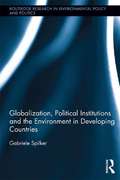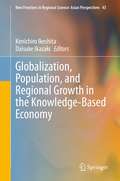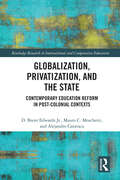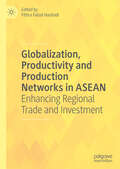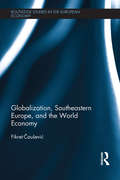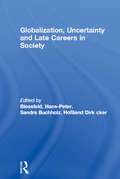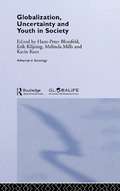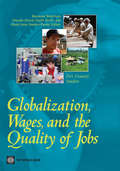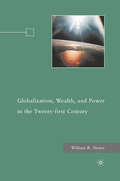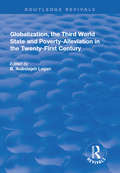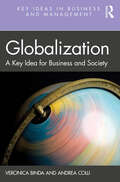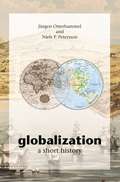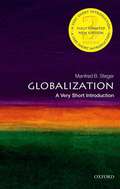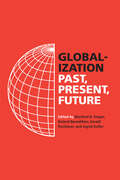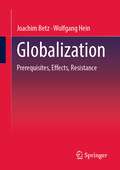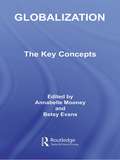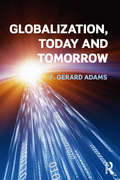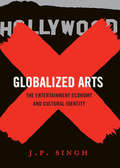- Table View
- List View
Globalization, Police Reform and Development
by Graham Ellison Nathan W. PinoThis volume presents a unique examination of Western-led police reform efforts by theoretically linking neoliberal globalization, police reform and development. The authors present seven country case studies based on this theoretical and conceptual approach and assess the prospects for successful police reform in a global context.
Globalization, Political Institutions and the Environment in Developing Countries (Routledge Research in Environmental Policy and Politics)
by Gabriele SpilkerThough industrialized countries are usually the ones indicted when environmental pollution is discussed, over the few last years the rate of emissions in developing countries has increased by a startling amount. The fallout from this increase is evidenced by the struggle of cities like Beijing to improve their air quality. Yet there also exist developing countries such as Thailand that have managed to limit their emissions to more tolerable levels, raising the question: why are some developing countries more willing or able to take care of their environment than others? In this volume, Gabriele Spilker proposes two factors for the differences in developing countries’ environmental performance: integration into the international system and domestic political institutions. Focusing on developing countries generally but also closely examining important global powers such as China and India, Spilker employs a rigorous quantitative analysis to demonstrate the importance of considering various aspects of the international system, in order to draw more comprehensive conclusions about how globalization affects environmental performance. She asserts that democratic political institutions can shield developing countries from the negative consequences of either trade or foreign direct investment. But at the same time, developing countries, by avoiding demanding commitments, are more likely to use environmental treaties as a cover than as a real plan of action. Adding a new dimension to the existing body of research on environmental quality and commitment, Spilker convincingly demonstrates how international and domestic political factors interact to shape developing countries’ ability and willingness to care for their natural environment.
Globalization, Population, and Regional Growth in the Knowledge-Based Economy (New Frontiers in Regional Science: Asian Perspectives #43)
by Kenichiro Ikeshita Daisuke IkazakiThis book clarifies how globalization, progress in the knowledge-based economy, and demographic change affect regional economic growth, using the latest analytical methods for economic growth. In the last 30 years, Asian countries have realized remarkable economic growth and are expected to become major growth centers of the world economy in the future. On the other hand, many researchers and policy makers point out that the Asian economy will face numerous challenges to sustain its growth. Specifically, globalization, realization of the knowledge-based economy, and population decline will bring about major changes in the structure of the Asian economy. This book provides the reader with the analytical framework to investigate how these structural changes affect regional economic growth. Moreover, the book covers topics such as foreign direct investment, quality of institutions, intergenerational conflict, education policies, and household fertility decision, all of which are comprehensively explained from the point of view of economic growth. Therefore, the scope of this volume is not only contemporary but also important for going beyond the usual regional economics and growth literature. This work is highly recommended to academic researchers and students who are interested in various aspects of regional economic growth.
Globalization, Privatization, and the State: Contemporary Education Reform in Post-Colonial Contexts (Routledge Research in International and Comparative Education)
by D. Brent Edwards Jr. Mauro C. Moschetti Alejandro CaravacaThis text explores how the dynamics of globalization and privatization have influenced state policy and impacted education reform in Honduras. Chapters document historical trends and the evolution of Honduras as a post-colonial nation, before looking in detail at recent state interventions in policy at pre-school, elementary, and secondary level. By offering empirical analysis of the Honduran education sector, the changing role and priorities of the state, and the increasing involvement of international organizations, NGOs, and private actors in the provision of education, the text increases understanding of how state theory interacts with broader global dynamics to impact education. This text will benefit researchers, academics, and educators with a focus on international and comparative education, policy analysis, globalization, and international development.
Globalization, Productivity and Production Networks in ASEAN: Enhancing Regional Trade and Investment
by Fithra Faisal HastiadiThis book examines the challenges that ASEAN (Association of Southeast Asian Nations) members need to overcome in order to sustain and intensify economic growth. The ASEAN market is widely regarded as a new hub of growth, not least in light of increasing protectionism and declining economic growth of the three largest countries in Northeast Asia (China, Japan, and South Korea). Contributors address a range of issues with a concentrated focus on evidence from Indonesia, including globalisation, increasing populism, trade, FDI, the benefits of the production network, and related issues such as spill-over, crises, innovation and technology, and selected sectoral commodity and policy analysis of Indonesia. This book analyses and explains the relationship between trade and foreign direct investment, and technical changes, with regard to improving ‘productivity’ in the supply-side economic growth model using, in particular, Indonesia as the de facto leader of ASEAN. This book will be of interest to academics and students specialising in international economics and international development.
Globalization, Robots, and the Future of Work
by Jeffrey A. Joerres Amy BernsteinWhen Jeffrey Joerres first joined Manpower, in 1993, the labor market was relatively stable and the company still focused largely on traditional office, clerical, and industrial staffing. But since then globalization and rapid advances in technology have dramatically reshaped the employment landscape. During his 15 years as CEO, Joerres expanded the company's international operations and moved into the increasingly competitive market for IT, finance, and engineering professionals. In this interview with HBR's editor, he describes how micromarket analysis reveals "geolocated pools of skills" that businesses can tap--until competitors muscle in, deplete the skills pool, and drive up wages. So companies must acquire a "nomadic mentality" that will allow them to establish more-temporary, smaller operations as well as large ones. He acknowledges that "when full-scale robotics and artificial intelligence arrive in a broad-based, affordable, easily justifiable way," hordes of workers will be displaced, with little or no preparation for very different jobs. Joerres advises companies that want to develop a workforce strategy to put multiple work models in place--crowdsourcing, distant manufacturing, temporary contractors moving to full-time--and truly practice them. "When are we done with this efficiency thing?" he says. "The answer is never."
Globalization, Southeastern Europe, and the World Economy (Routledge Studies in the European Economy)
by Fikret CausevicThis book explores the key economic issues facing Southeastern Europe and Bosnia and Herzegovina, within the context of the serious challenges that the global economy has faced in recent years. The book combines rigorous analysis of the issues faced by the region with a constructive approach to identifying solutions for a positive future trajectory. The book starts by exploring the economic challenges facing the world economy both before and during the global economic crisis. The second part of the volume focuses on south-eastern Europe, and especially on the Western Balkans, assessing the best ways of achieving a positive economic future for small open economies in the region. The final part of the volume examines the economic challenges in Bosnia and Herzegovina. The final section examines the economic challenges in Bosnia and Herzegovina, arguing that it is most useful to view the country within the context of the regional and global economies. The book will be extremely useful for scholars working on European Economics, transition economics, and the global economy and the financial crisis.
Globalization, Uncertainty and Late Careers in Society (Routledge Advances in Sociology)
by Dirk Hofäcker Hans-Peter Blossfeld Sandra BuchholzGlobalization has been strongly shaping and transforming both national economies and individual careers in recent decades. These profound changes have had significant consequences for individual careers of men and women both during and after their employment career. This impressive new collection focuses on the effects of the globalization process on late-midlife workers and the exit from employment – a relationship that has up to now mostly been neglected in social science literature on aging and employment. The research documented within these pages poses several important questions: * Has globalization produced fundamental shifts in late-midlife workers’ labor market participation and late careers? * What transformations in old age career mobility can we observe? * How are these transformations filtered by different national institutional settings? With an impressive array of contributions, this volume will interest students and academics involved in the study of sociology, welfare and globalization.
Globalization, Uncertainty and Youth in Society: The Losers in a Globalizing World (Routledge Advances in Sociology)
by Melinda Mills Hans-Peter Blossfeld Erik Klijzing Karin KurzExamining how youths in fourteen industrialized societies make the transition to adulthood in an era of globalization and rising uncertainty, this collection of essays investigates the impact that institutions working with social groups of youths have upon those youths' abilities to make adult decisions determining their life courses. Covering both Europe and North America, the book includes case studies, and contains country-specific contributions on conservative, social-democratic, post-socialist, liberal and familistic welfare regimes, as well as data from the GLOBALIFE project. Filling the gap in the market on the micro effects of globalization on individuals, and taking an empirical approach to the topic, this impressive volume brings the individual and nation-specific institutions back into the discussion on globalization.
Globalization, Wages, and the Quality of Jobs
by Drusilla Brown Raymond Robertson Gaëlle Le Borgne Pierre Maria Laura Sanchez-PuertaSince the early 1990s, most developing economies have become more integrated with the world's economy. Trade and foreign investment barriers have been progressively lifted and international trade agreements signed. These reforms have led to important changes in the structures of these economies. The labor markets have adjusted to these major changes, and workers were required to adapt to them in one way or another. In 2006, the Social Protection Unit of the World Bank launched an important research program to understand the impact that these profound structural changes have had on workers in developing countries. 'Globalization, Wages, and the Quality of Jobs: Five Country Studies' presents the findings and insights of this important research program. In particular, the authors present the similar experiences of low-income countries with globalization and suggest that low-income countries' working conditions have improved in the sectors exposed to globalization. However, 'Globalization, Wages, and the Quality of Jobs' also highlights concerns about the sustainability of these improvements and that the positive demonstration effects on the rest of the economy are unclear. The empirical literature that exists, although vast, does not lead to a consensus view on globalization's eventual impact on labor markets. Understanding the effects of globalization is crucial for governments concerned about employment, working conditions, and ultimately, poverty reduction. Beyond job creation, improving the quality of those jobs is an essential condition for achieving poverty reduction. 'Globalization, Wages, and the Quality of Jobs' adds to the existing literature in two ways. First, the authors provide a comprehensive literature review on the current wisdom on globalization and present a micro-based framework for analyzing globalization and working conditions in developing countries. Second, the authors apply this framework to five developing countries: Cambodia, El Salvador, Honduras, Indonesia, and Madagascar. This volume will be of interest to government policy makers, trade officials, and others working to expand the benefits of globalization to developing countries.
Globalization, Wealth, and Power in the Twenty-first Century
by William R. NesterThis book offers an in-depth exploration of all dimensions of geoeconomics, including the internal and international forces which explain why most countries remain mired in poverty; the conflicts between the poor on the rich countries; and the global environmental crises threatening the future of humanity.
Globalization, the Third World State and Poverty-Alleviation in the Twenty-First Century (Routledge Revivals)
by B. Ikubolajeh LoganThis title was first published in 2002.Bringing together an inspiring mix of US and African contributors, this book explores the dynamics of the unfolding globalized economic, political, socio-cultural and environmental systems. Featuring incisive international commentary on the causes and consequences of poverty in the Third World it presents a powerful study of the strategies by which Third World governments and civil society can overcome poverty by insinuating themselves more creatively into the global order. The result is one of the defining works so far produced on the tensions between globalization and development.
Globalization: A Key Idea for Business and Society (Key Ideas in Business and Management)
by Andrea Colli Veronica BindaGlobalization: A Key Idea for Business and Society analyzes today’s process of global integration. Globalization is seen as a complex phenomenon, the drivers of which are of a technological, institutional, cultural and, not least, political nature.The book includes a historical analysis of the rise, and fall, of the “first globalization” wave which took place between the end of the Napoleonic Wars and the Great War. The chapters focus on the measurement of the global integration process, on the in-depth analysis of the above mentioned “drivers”, and on some of the actors playing a relevant role in the process itself – multinational companies and governments as owners of global companies. The conclusion of the book provides a perspective on the current “globalization backlash”, its determinants and possible future alternative scenarios.This book is an ideal resource for students and practitioners interested in past, present and future globalization.
Globalization: A Short History
by Niels P. Petersson Jürgen Osterhammel"Globalization" has become a popular buzzword for explaining today's world. The expression achieved terminological stardom in the 1990s and was soon embraced by the general public and integrated into numerous languages. But is this much-discussed phenomenon really an invention of modern times? In this work, Jürgen Osterhammel and Niels Petersson make the case that globalization is not so new, after all. Arguing that the world did not turn "global" overnight, the book traces the emergence of globalization over the past seven or eight centuries. In fact, the authors write, the phenomenon can be traced back to early modern large-scale trading, for example, the silk trade between China and the Mediterranean region, the shipping routes between the Arabian Peninsula and India, and the more frequently traveled caravan routes of the Near East and North Africa--all conduits for people, goods, coins, artwork, and ideas. Osterhammel and Petersson argue that the period from 1750 to 1880--an era characterized by the development of free trade and the long-distance impact of the industrial revolution--represented an important phase in the globalization phenomenon. Moreover, they demonstrate how globalization in the mid-twentieth century opened up the prospect of global destruction though nuclear war and ecological catastrophe. In the end, the authors write, today's globalization is part of a long-running transformation and has not ushered in a "global age" radically different from anything that came before. This book will appeal to historians, economists, and anyone in the social sciences who is interested in the historical emergence of globalization.
Globalization: A Very Short Introduction (Third Edition)
by Manfred Steger'Globalization' has become one of the defining buzzwords of our time - a term that describes a variety of accelerating economic, political, cultural, ideological, and environmental processes that are rapidly altering our experience of the world. It is by its nature a dynamic topic - and thisVery Short Introduction has been fully updated for a third edition, to include recent developments in global politics, the global economy, and environmental issues. Presenting globalization in accessible language as a multifaceted process encompassing global, regional, and local aspects of social life, Manfred B. Steger looks at its causes and effects, examines whether it is a new phenomenon, and explores the question of whether, ultimately, globalization is agood or a bad thing.
Globalization: Past, Present, Future
by Manfred B. Steger, Roland Benedikter, Harald Pechlaner, and Ingrid KoflerA free ebook version of this title is available through Luminos, University of California Press’s Open Access publishing program. Visit www.luminosoa.org to learn more. Since the end of the Cold War, globalization—the process and the idea—has been reshaping the world. Global studies scholarship has emerged to make sense of the transnational manifestations of globalization: economic, social, cultural, ideological, technological, environmental, and postcolonial. But a series of crises in the first two decades of the twenty-first century has put the neoliberal globalization system of the 1990s under severe strain. Are we witnessing a turn toward "deglobalization," intensified by the COVID-19 pandemic and the war in Ukraine or a moment of "reglobalization," spearheaded by digital technology? The contributors to this book employ transdisciplinary research to assess past developments, the current state, and future trajectories of globalization in light of today’s dynamics of insecurity, volatility, and geopolitical tensions.
Globalization: Prerequisites, Effects, Resistances
by Joachim Betz Wolfgang HeinThis textbook deals with the progressive global dissolution of political, economic, and social boundaries, which has significant implications for labor markets, the international division of labor, social security, and income distribution. Politically, it is eroding the sovereign ability of nation-states to shape their own affairs; socially, it conjures up the specter of an increasingly global culture of unity. Against the background of the empirical effects of globalization processes in a number of areas, the book discusses to what extent these fears are justified, whether they cannot also be explained by other developments, and whether the benefits of globalization justify the costs and risks resulting from it.
Globalization: State of the Art and Perspectives (Routledge Frontiers of Political Economy #84)
by Stefan A. SchirmGlobalization is the first volume which systematically encompasses the debates and the results of research of political scientists on all core aspects of the interrelation between politics and economics in the process of globalization. This volume shows how research on globalization has reached a degree of differentiation and depth that makes it necessary and attractive to assess the state-of-the-art and perspectives for further research. With contributions from international experts including Andreas Busch, Nadine Haase and Edgar Grande.
Globalization: The Key Concepts (Routledge Key Guides)
by Annabelle Mooney Betsy EvansViewed as a destructive force or an inevitability of modern society, globalization is the focus of a multitude of disciplines. A clear understanding of its processes and terminology is imperative for anyone engaging with this ubiquitous topic. Globalization: the Key Concepts offers a comprehensive guide to this cross-disciplinary subject and covers concepts such as: homogenization neo-Liberalism risk knowledge society time-space compression reflexivity. With extensive cross-referencing and suggestions for further reading, this book is an essential resource for students and interested readers alike as they navigate the literature on globalization studies.
Globalization: The Return of Borders to a Borderless World?
by Richard W. Mansbach Yale H. FergusonWritten by two leading scholars of global politics, Globalization: the return of borders to a borderless world? is a major new book for students of globalization. It describes and explains globalization and its origins, and examines its future in light of key recent political and global trends and events. The text: identifies the different political, economic, technological, and cultural meanings of globalization examines its historical origins from the ancient past through the Cold War and into the twenty-first century describes the multiple attributes and consequences of globalization including its effect on the sovereignty of the nation state discusses recent trends such as the increased use of social media and events like the Arab Spring assesses the normative implications of globalization analyzes the challenges to globalization posed by contemporary events such as the global financial crisis. This book will be essential reading for all students of globalization, and will be of great interest to students of global politics and global governance.
Globalization: What's New
by Michael M. WeinsteinWith original contributions from ten eminent economists, this collection presents diverse and original perspectives on globalization. The contributors analyze recent trends in trade, immigration, and capital flows; why some poor countries have grown while others have stagnated during the past two decades; globalization's impact on jobs and wages in poor countries and in the United States; the surprising environmental benefits of globalization; the degree to which foreign aid helps developing countries; the failures of international institutions to govern the global economy and supporting democracy; and how foreign loans and investments can wreak havoc on a nation's economy.
Globalization: What's New? (Globalization And Community Ser. #54)
by Ed. Weinstein Michael M.From the streets of Seattle to corporate boardrooms to new factories in third-world nations, globalization is subject to very different and often explosively divergent interpretations. Where some see globalization as driving poor countries into further poverty, others see it as the path to economic salvation and democratic rule. With original contributions from ten eminent economists, Globalization: What's New cuts through the confusion and rhetoric to offer straightforward, incisive analysis of globalization and its future.Coming from some of globalization's most prominent supporters (David Dollar), its most vocal critics (Joseph Stiglitz), and those in-between, this collection presents diverse and original perspectives on globalization's immense reach that dig to the core of many debates. The contributors analyze recent trends in trade, immigration, and capital flows; why some poor countries have grown while others have stagnated during the past two decades; future opportunities for low-wage workers; globalization's impact on jobs and wages in poor countries and in the United States; the surprising environmental benefits of globalization; the degree to which foreign aid helps developing countries; the failures of international institutions in governing the global economy and supporting democracy; and how foreign loans and investments can wreak havoc on a nation's economy.
Globalization; Today and Tomorrow
by Gerard F AdamsThis book seeks to examine the basis of economic globalization, yesterday, today, and tomorrow, and to link the outcome of globalization into the context of the new economic geography. It shows how the phenomenon is exhibited in the light of current events, providing a good way to keep understand today’s world economy.
Globalized Arts: The Entertainment Economy and Cultural Identity
by J. P. SinghOur interactive world can take a cultural product, such as a Hollywood film, Bollywood song, or Latin American telenovela, and transform it into a source of cultural anxiety. What does this artwork say about the artist or the world she works in? How will these artworks evolve in the global market? Film, music, television, and the performing arts enter the same networks of exchange as other industries, and the anxiety they produce informs a fascinating area of study not only for art and culture but also for global politics. Focusing on the confrontation between global politics and symbolic creative expression, J. P. Singh shows how, by integrating themselves into international markets, entertainment industries give rise to far-reaching cultural anxieties. With examples from Hollywood, Bollywood, French grand opera, Latin American television, West African music, postcolonial literature, and even the Thai sex trade, Singh cites both the attempt to address cultural discomfort and the effort to deny entertainment acts as cultural. He connects creative expression to clashes between national identities, and he details the effect of cultural policies, such as institutional patronage and economic incentives, on the making and incorporation of art into the global market. Ultimately, Singh shows how these issues impact the debates on cultural trade being waged by the World Trade Organization, UNESCO, and the developing world.
Globalized Arts: The Entertainment Economy and Cultural Identity
by J. P. SinghOur interactive world can take a creative product, such as a Hollywood film, Bollywood song, or Latin American telenovela, and transform it into a source of cultural anxiety. What does this artwork say about the artist or the world she works in? How will these artworks evolve in the global market? Film, music, television, and the performing arts enter the same networks of exchange as other industries, and the anxiety they produce informs a fascinating area of study for art, culture, and global politics.Focusing on the confrontation between global politics and symbolic creative expression, J. P. Singh shows how, by integrating themselves into international markets, entertainment industries give rise to far-reaching cultural anxieties and politics. With examples from Hollywood, Bollywood, French grand opera, Latin American television, West African music, postcolonial literature, and even the Thai sex trade, Singh cites not only the attempt to address cultural discomfort but also the effort to deny entertainment acts as cultural. He connects creative expression to clashes between national identities, and he details the effect of cultural policies, such as institutional patronage and economic incentives, on the making and incorporation of art into the global market. Ultimately, Singh shows how these issues affect the debates on cultural trade being waged by the World Trade Organization, UNESCO, and the developing world.

